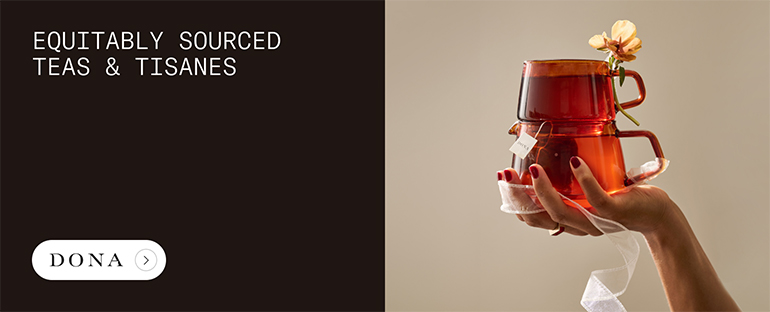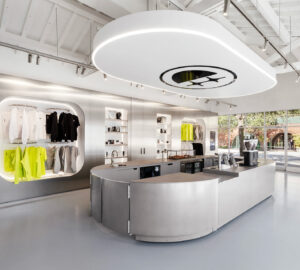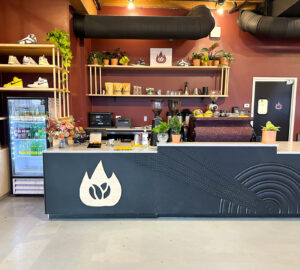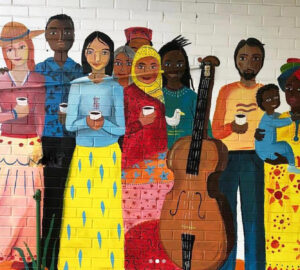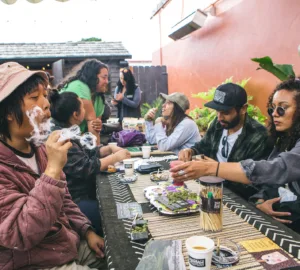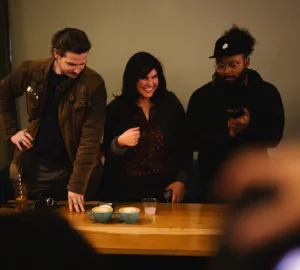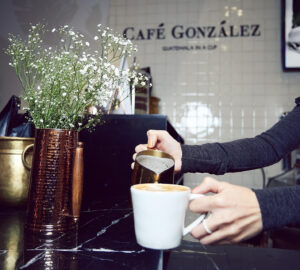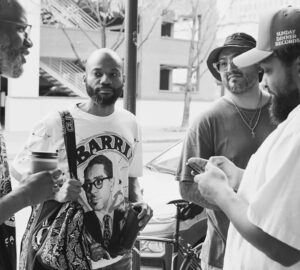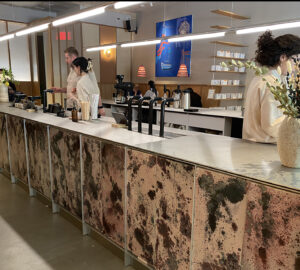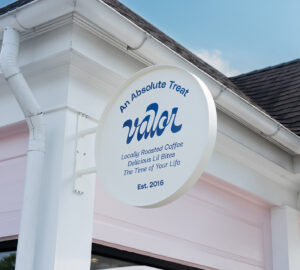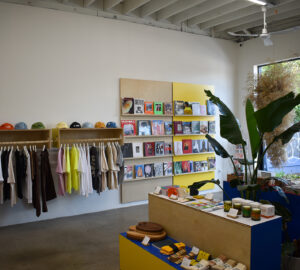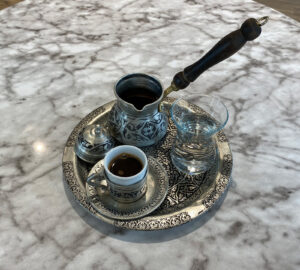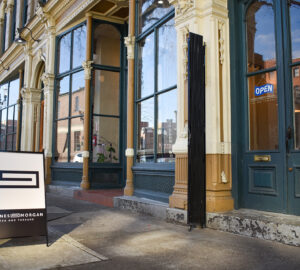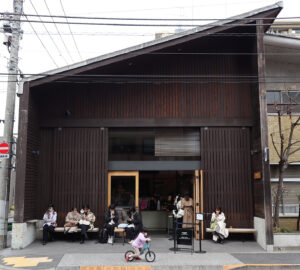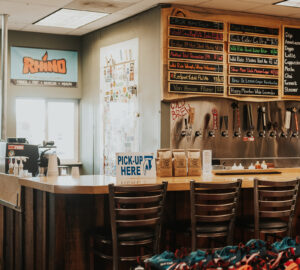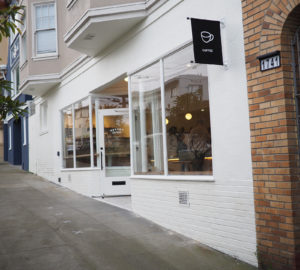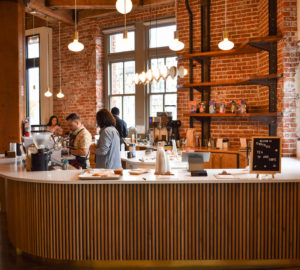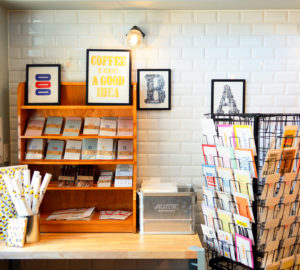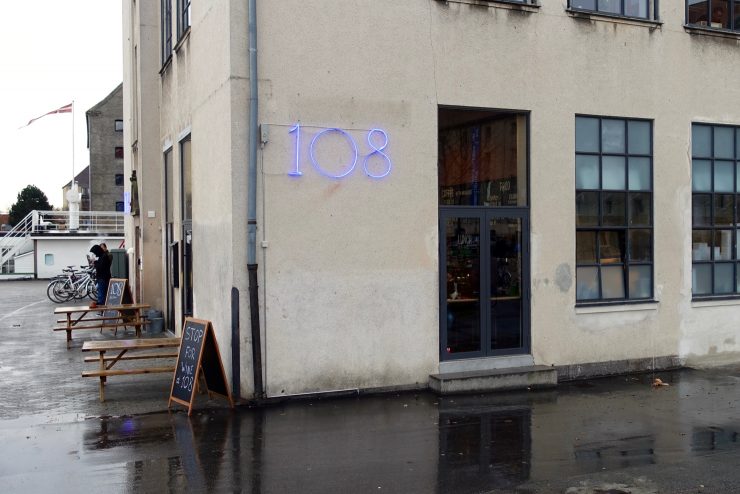
When the new Copenhagen restaurant and cafe project 108 was announced, the world quickly deemed it to be the “little sibling” of Noma, Rene Redzepi’s iconic two-Michelin-star standard bearer of “New Nordic cuisine.” In some ways, this could not be helped: 108 is linked to Noma by both ownership and expertise, and is located just steps away from it at the edge of Copenhagen’s Christianshavn neighborhood. But after repeat visits, I’m happy to report that 108 has created an atmosphere that is genuinely separate and unique to its forebear, while maintaining a through-line of quality and focused experimentation. 108 is an utterly delicious exhibition of modern food, wine, and coffee, but here you can actually get a reservation, and your experience is available at a fraction of Noma’s price.
Redzepi co-owns both establishments, but the kitchen at 108 is in the capable hands of chef Kristian Baumann, his new business partner. Baumann isn’t new to Nordic food, having formerly worked for Redzepi at Noma as well as with Chef Christian Puglisi at both Relæ and Manfreds before joining back up with Redzepi for 108. Despite all of the family metaphors being tossed around, in most regards, the only thing smaller about the 108 experience is the bill when you leave. This is a more accessible place to experience Redzepi & Co.’s iconic Noma-inspired flavor explorations and further spread the “New Nordic” manifesto.
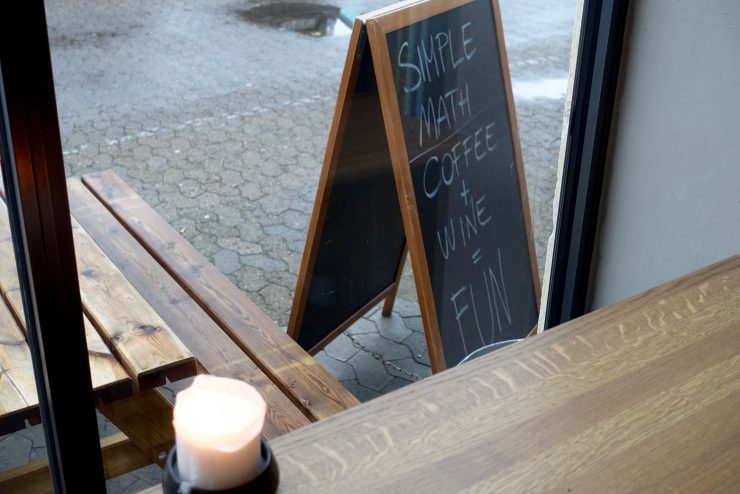
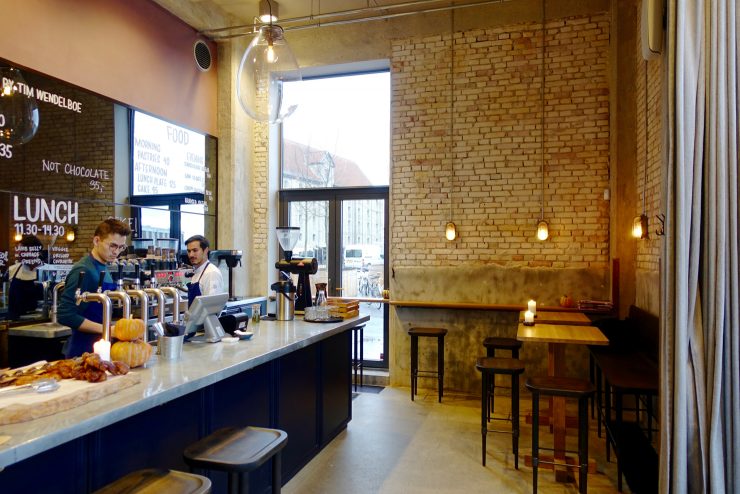
I recently finished a gluttonous sojourn to the lauded new locale, where I indulged in a complete days’ worth of meals—breakfast, lunch, dinner, and a mandatory fika. In the end, my receipts totaled half what it costs for a single meal with a wine pairing at Noma ($440). And while it’s quite unfair to compare an á la carte-style bistro to the singular experience that is Noma, the attention to detail, the hospitality, and the unique flavors that have come to define Noma are very much woven into the fabric of 108. While some ingredients and knowledge are shared between the two, including the results of ongoing research in Noma’s fermentation lab, 108 still maintains a test kitchen of their own and a menu that will fill you up with four dishes instead of 23.
Before arriving at 108, the day began with a morning stroll along Nyhavn (New Harbor), a postcard-perfect stretch of 17th-century houses which possess the power to transport your imagination to another time and place. The brightly colored facades line a canal which, in another era, was one of Copenhagen’s busy commercial ports. The buildings themselves have been the home to their share of Danish luminaries, including the fairy tale author Hans Christian Andersen. When the sun shines just right it’s easy to see how the sparkling water and vibrant glow of the colored houses could inspire great art.
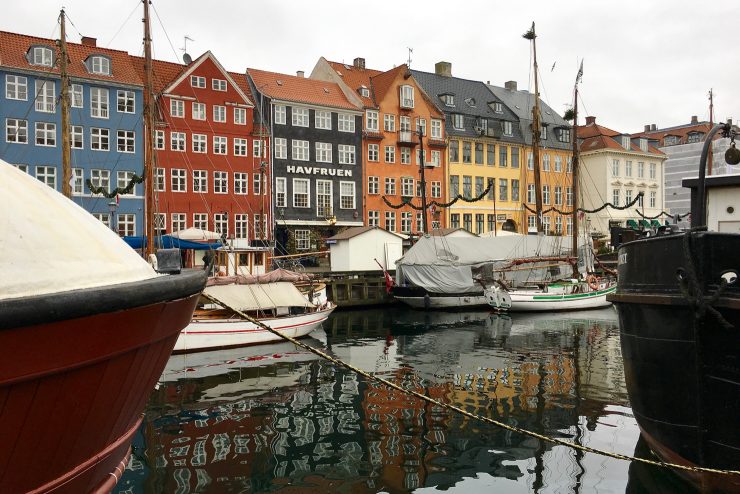
At the southern end of Nyhavn is Inderhavnsbroen (Inner Harbor Bridge), a newly completed pedestrian and cycling bridge that connects the center of Copenhagen directly to Christianshavn. This bridge has been hanging (literally) in the balance since 2013 after its original financial backer went bankrupt and a design flaw forced engineers to reevaluate the entire project. After years of teasing the city with an easy way to cross the harbor, one now exists. The bridge officially opened just weeks after 108 and the southern stretch makes landfall right outside their door. This convenient crossing will ensure that 108 becomes an irresistible stop for morning commuters as well as providing nearby residents with a local spot to congregate over great coffee and wine.
There are two distinct sides to 108: the northern point of the building is referred to as “The Corner”, and there’s also “The Restaurant,” which doesn’t open until 5 p.m. The Corner is where the morning magic happens, serving batch brewed coffee and espresso using beans from Tim Wendelboe, the renowned coffee roaster in Oslo, Norway. The coffee program at 108 was set up by Wendelboe himself, who also helped transform the coffee service at Noma nearly four years ago, shining a spotlight on the quality of coffee (or lack thereof) in Michelin-star restaurants. However, the coffee at 108 is served without pretension and very little presentation at all. Which is surprising, albeit refreshing, considering the high expectations for a place with such acclaimed culinary capacity. However, it’s just really tasty coffee that is brewed well and served quickly—and for only 25 DKK ($3.50) it is one of the cheaper cups of specialty coffee you will find in a city known for hurting wallets.
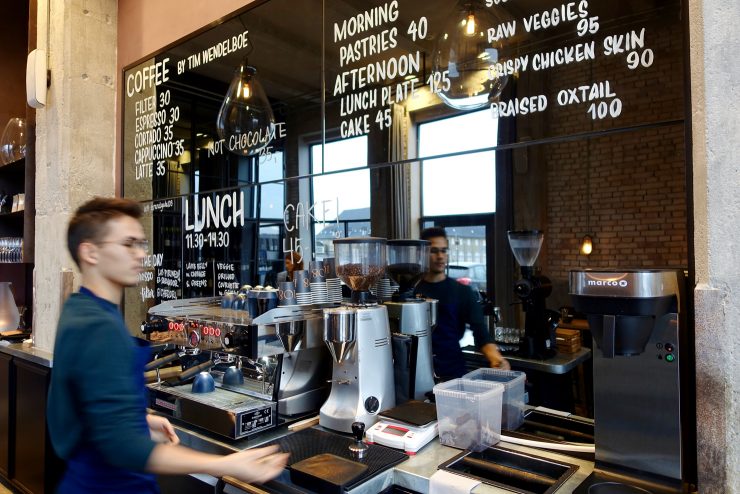
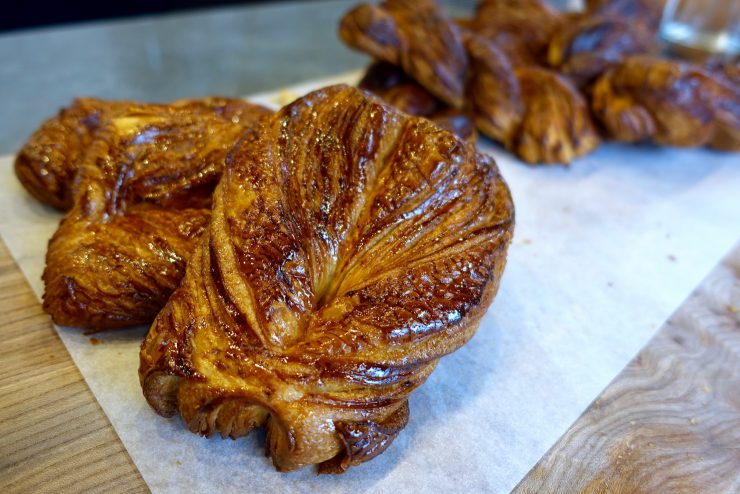
As much as I enjoy a cup of coffee from Tim Wendelboe, the real morning star at 108 are the house made pastries. There are three flavors that rotate according to the season, available ingredients, and what pairs well with the current coffees being served. All three varieties use the same flaky croissant dough, but they are layered with different flavors of glaze and fillings before being twisted and knotted into unique configurations. During my visit, the options included one with a sweetly acidic coffee kombucha glaze, one with tart Danish apples, and one large savory twist made with fermented beef garum. Without a second thought, I ordered all three of them.
While I sat enjoying breakfast, it struck me how different the atmosphere here was compared to the specialty coffee shops where I usually find myself. The interior had some modern Danish design hallmarks, but it felt more like a French wine bar than a Third Wave cafe. This distinction was an important part of the charm. I was able to relax and simply enjoy all the good things without feeling obliged to worship at an altar of coffee. The tall mirrors behind the bar reflected the morning light and made the cozy space feel much larger while reinforcing the feel of a southern European bistro.
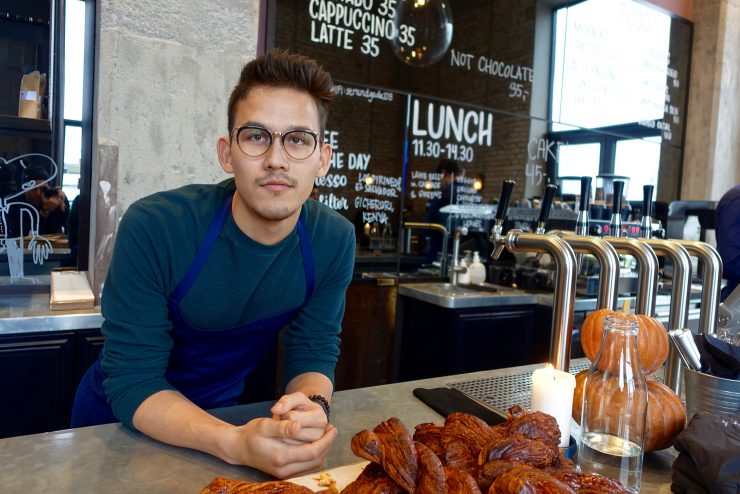
As I chatted with a friend beside me at the bar, we began talking with Anders Lorenz, one of the servers at The Restaurant who also worked shifts at The Corner to participate in both sides of the experience. Lorenz was previously a server at Noma and spoke to us at length about the food experiments at Noma’s fermentation lab and how that knowledge had been transferred to 108. We tasted bits of barley fermented with koji that’s used to make a sweetened umami-like drink called “not chocolate” while he explained the process for making their coffee kombucha glaze used on the pastries.
When it was time for lunch the demand for seating far exceeded 108’s small size, but the lunch menu includes just one meat and one vegetarian choice that provides a quick turnaround for guests. The vegetarian option was a generous bowl of grilled zucchini with gammal knas (an aged Danish Havarti) and blackcurrant leaves, while the meat option was a dish of lamb belly and onions. The lunch plates change regularly and usually represent slight variations of dishes from the dinner menu. The lunch was more than enough to satisfy my appetite and it provides an easy way to preview the food from The Restaurant without having to commit to dinner. If you’re not heading back to work, there’s also an impressive list of natural wines that carry into the night when The Corner becomes a wine bar, serving snacks like organic fried chicken skins with shitake mushroom and ramson mayo. I ordered a glass of the “Himmel Auf Erden” white blend produced by Christopher Tschida in Austria and relaxed, knowing I had nowhere to be until dinner.
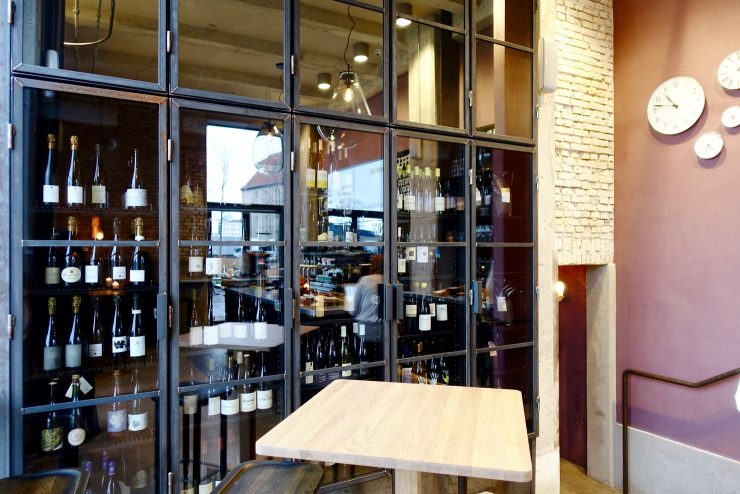
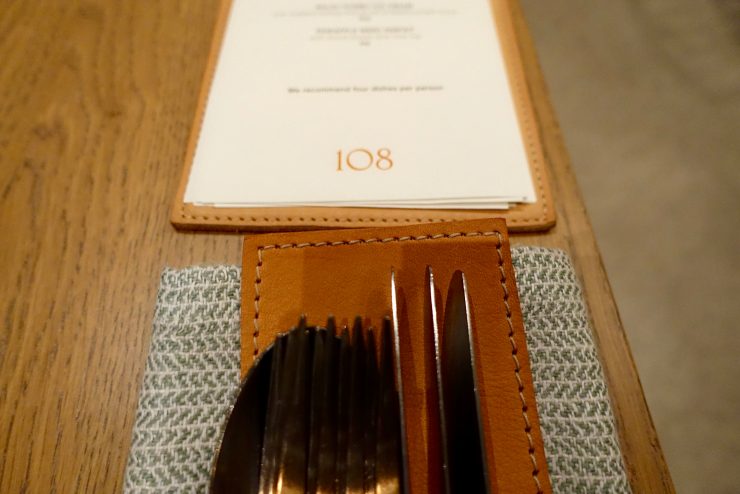
I arrived for dinner at 5 p.m., an early reservation that I made the day before. There were quite a few midweek openings, but The Restaurant also has room for walk-ins. This side of 108 is much larger. It has the same high ceilings with massive handblown glass bulbs flowing down from overhead but feels more Scandinavian overall. The light wooden benches with soft corners add warmth to a room where massive concrete pillars hold everything in place. The custom leather cutlery holders sit beside handmade ceramics and thick woven napkins. While it has still maintained its own character, upon walking into the 108 dining room you are reminded of its connection to Noma.
My server was young, casual, and conversational. His personality alone helped maintain the ambiance of informality that has permeated every aspect of 108. I ordered six dishes exploring a range of flavors that coalesced from sweet and refreshing to savory and dynamic. There was thinly sliced pumpkin with goat cheese and blackcurrant leaves, raw shrimp with sweet and salted plums, lamb tartare dusted with charred onion, and braised oxtail puffs with shaved truffles. I followed the main dishes with two desserts, a parfait made from pineapple weed with rose hips and sweet plums, and a wild blueberry ice cream served in a sourdough cone topped with pine needle sprinkles—which would have been worth the visit all on its own.
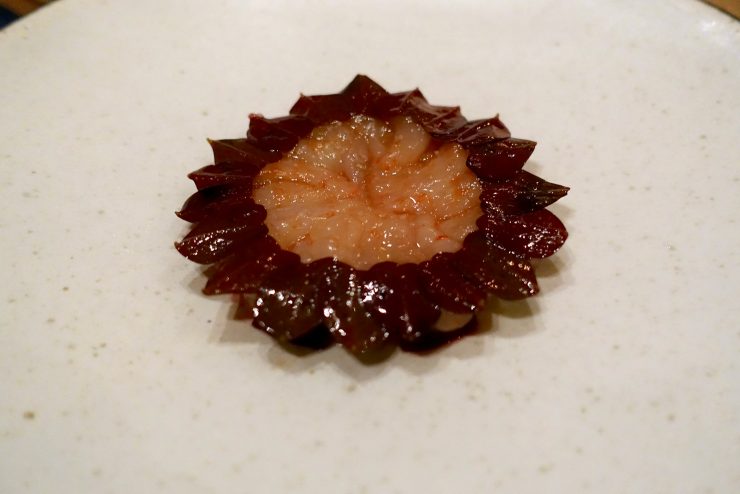
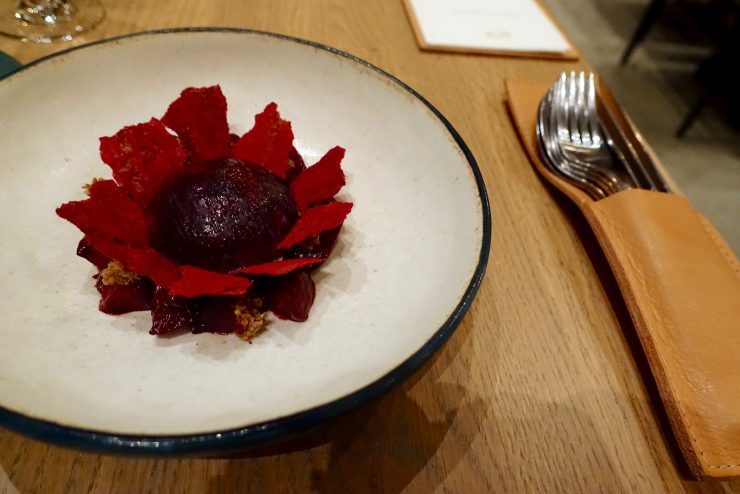
At this point I finished my last glass of wine, Loire winemaker Olivier Cousin’s “Pur Breton” Cabernet Franc, and ordered a coffee to cap the night off. The options presented for coffee were straightforward—filter coffee or espresso—and came directly from The Corner. I ordered a cup of brewed coffee, Kenya Gicherori, and it arrived shortly after in a handmade ceramic cup with no explanation other than to enjoy. It was simple, without any need to confirm or explain the quality of the product. It was assumed. There was no presentation of its preparation or declarations about the use of milk or sugar. I was merely left with my cup to decide for myself if the coffee met the expectations set forth by everything that preceded it. I let it cool, took a sip, and it did.
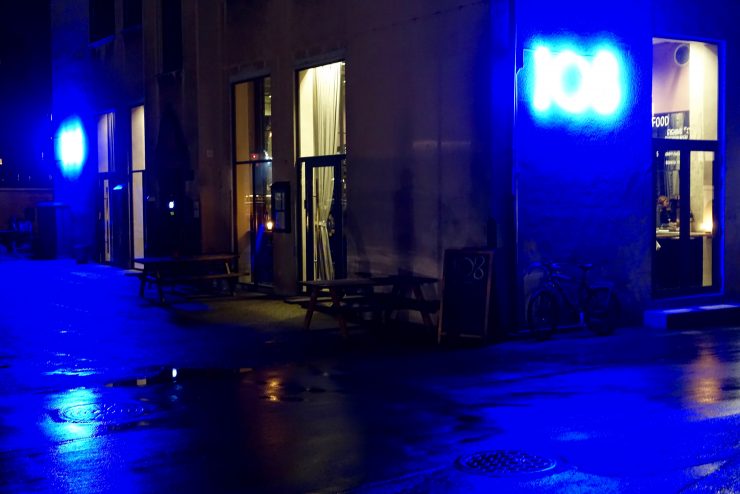
Brian W. Jones is the publisher of Dear Coffee, I Love You, author of Brew: Better Coffee At Home, and the creator of Welcome™, an international branding and design studio based in Stockholm, Sweden. This is Brian W. Jones’ first feature for Sprudge.














